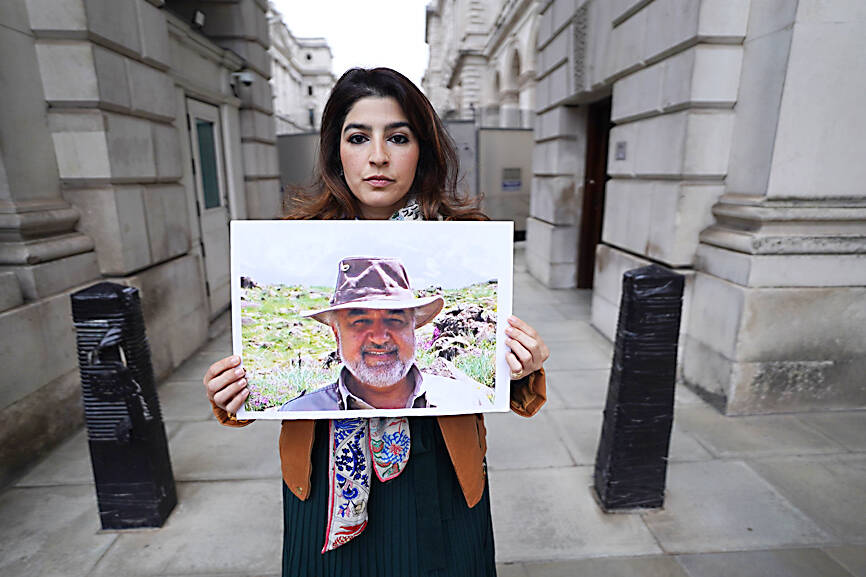Iran has moved five Americans from jail to house arrest, officials and family members said on Thursday, in the first step of a delicate deal that would unfreeze billions of US dollars of Iranian funds and allow the prisoners to leave the Islamic republic.
The progress on the prisoners — one of them detained for nearly eight years — comes after quiet, exhaustive diplomacy between the longtime adversaries, whose separate talks on restoring a nuclear deal broke down.
“My belief is that this is the beginning of the end of their nightmare, and the nightmare that their families have experienced,” US Secretary of State Antony Blinken told reporters.

Photo: AP
Sources familiar with the negotiations said the next step would be the transfer of US$6 billion in Iranian oil revenue frozen in South Korea to a special account in Qatar which Iran could access only for humanitarian purchases such as food and medicine.
Iran described the deal as a prisoner swap, with the state-run IRNA agency quoting Tehran’s mission to the UN as saying that each nation would be “granting amnesty and releasing five prisoners.”
If all goes as planned, the American prisoners could leave Iran sometime next month, one source said on condition of anonymity.
Four of the prisoners — Siamak Namazi, Emad Sharqi, Morad Tahbaz and another who preferred to remain anonymous — on Thursday were taken out of Tehran’s notorious Evin prison, a day after US President Joe Biden’s administration informed their families of the deal.
The four were escorted to a hotel where they would remain held under guard, a lawyer for one of the prisoners said.
Sources said that a fifth American, a woman, is also part of the discussions and had already been moved to house arrest.
“While this is a positive change, we will not rest until Siamak and others are back home; we continue to count the days until this can happen,” Babak Namazi, Siamak’s brother, said in a statement.
At the center of discussions has been the unblocking of the US$6 billion that Iran earned selling oil to South Korea.
Seoul blocked the funds to comply with US sanctions imposed under former US president Donald Trump that hit the Iranian economy hard.
While stressing that the arrangement was not final, sources said the funds would be converted from won to euros and administered by Qatar, which played a key mediatory role. No funds would be transferred directly to Iran.
Blinken made clear that the money already belonged to Iran and said: “Iran will not be receiving any sanctions relief.”
“Iran’s own funds would be used and transferred to restricted accounts such that the monies can only be used for humanitarian purposes,” he said.
Iranian state media said the prisoners would only be released once the money was deposited.
Former US president Barack Obama faced heated criticism from his Republican opponents for sending US$400 million in cash — also funds belonging to Iran — as he secured the release of a previous batch of prisoners while concluding a landmark nuclear accord with Tehran in 2015.
Republicans assailed Biden for the latest deal, saying it would ease budgetary pressure on Iran.
US Senator Tom Cotton, known for his hawkish views on Iran, accused Biden of a “craven act of appeasement [that] will only embolden the ayatollahs to take more hostages.”
There was no indication the prisoner deal would spur movement on restoring the nuclear accord, from which Trump pulled out.
Biden has bluntly dismissed prospects of reviving the 2015 agreement in the wake of a crackdown by Iran’s clerical leaders and mass protests led by women.

BLOODSHED: North Koreans take extreme measures to avoid being taken prisoner and sometimes execute their own forces, Ukrainian President Volodymyr Zelenskiy said Ukrainian President Volodymyr Zelenskiy on Saturday said that Russian and North Korean forces sustained heavy losses in fighting in Russia’s southern Kursk region. Ukrainian and Western assessments say that about 11,000 North Korean troops are deployed in the Kursk region, where Ukrainian forces occupy swathes of territory after staging a mass cross-border incursion in August last year. In his nightly video address, Zelenskiy quoted a report from Ukrainian Commander-in-Chief Oleksandr Syrskyi as saying that the battles had taken place near the village of Makhnovka, not far from the Ukrainian border. “In battles yesterday and today near just one village, Makhnovka,

US Secretary of the Treasury Janet Yellen on Monday met virtually with Chinese Vice Premier He Lifeng (何立峰) and raised concerns about “malicious cyber activity” carried out by Chinese state-sponsored actors, the US Department of the Treasury said in a statement. The department last month reported that an unspecified number of its computers had been compromised by Chinese hackers in what it called a “major incident” following a breach at contractor BeyondTrust, which provides cybersecurity services. US Congressional aides said no date had been set yet for a requested briefing on the breach, the latest in a serious of cyberattacks

In the East Room of the White House on a particularly frigid Saturday afternoon, US President Joe Biden bestowed the Presidential Medal of Freedom to 19 of the most famous names in politics, sports, entertainment, civil rights, LGBTQ+ advocacy and science. Former US secretary of state Hillary Rodham Clinton aroused a standing ovation from the crowd as she received her medal. Clinton was accompanied to the event by her husband, former US president Bill Clinton, daughter, Chelsea Clinton, and grandchildren. Democratic philanthropist George Soros and actor-director Denzel Washington were also awarded the nation’s highest civilian honor in a White House

Venezuelan opposition candidate Edmundo Gonzalez Urrutia was expected to meet Argentine President Javier Milei yesterday on a regional tour to drum up support ahead of Venezuelan President Nicolas Maduro’s swearing-in for a third term. Venezuelan authorities have offered a reward of US$100,000 for information leading to the capture of Gonzalez Urrutia, who insists he beat Maduro at the polls in July last year and is recognized by the US as Venezuela’s “president-elect.” The 75-year-old fled to Spain in September after being threatened with arrest by Maduro’s government, but has pledged to return to his country to be sworn in as